

Free Online Courses for College Credit Toward A Degree. MOOCs Are Really Great! But What's Next? - OWD2012. Major Players in the MOOC Universe - The Digital Campus 2013. Reviewing Christensen’s Disruptive Technologies (Harvard Business Review, 1995) in MOOC Terms. One of the common citations in xMOOC artifacts and discussion is the idea of xMOOC as a disruptive technology.
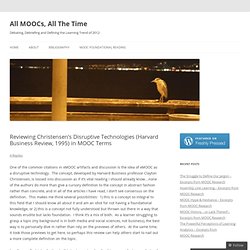
The concept, developed by Harvard Business professor Clayton Christensen, is tossed into discussion as if it’s vital reading I should already know…none of the authors do more than give a cursory definition to the concept in abstract fashion rather than concrete, and in all of the articles I have read, I don’t see consensus on the definition. This makes me think several possibilities: 1) this is a concept so integral to this field that I should know all about it and am an idiot for not having a foundational knowledge, or 2) this is a concept not fully understood but thrown out there in a way that sounds erudite but lacks foundation. MOOCs: The cutting announcement of the wrong revolution. A litany of recent complaints shows that something is wrong with higher education: Cost are rising with 10% every year (US), content has lost track with the explosive development of new knowledge, alumni’s competences do not match with the requirements of the labour market, teachers deliver lectures in the same way as their predecessors did for centuries, revenues for society are unclear. 40% of all students are leaving without a grade.
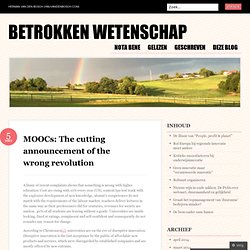
Universities are inside looking, fixed at ratings, complacent and self-confident and consequently do not consider any reason for change. According to Christensen[1], universities are on the eve of disruptive innovation. Disruptive innovation is the fast acceptance by the public of affordable new products and services, which were disregarded by established companies and are mostly offered by new entrants. Less than one year ago, the first MOOCs (massive online open course) were launched. To MOOC or Not to MOOC - WorldWise. MOOCs have become a media obsession.
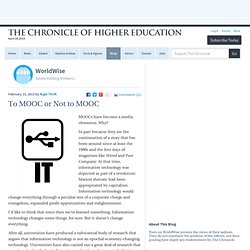
Why? How EdX Plans to Earn, and Share, Revenue From Free Online Courses - Technology. By Steve Kolowich How can a nonprofit organization that gives away courses bring in enough revenue to at least cover its costs?
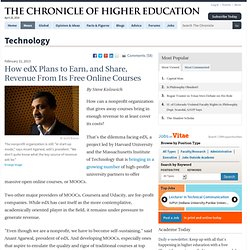
That's the dilemma facing edX, a project led by Harvard University and the Massachusetts Institute of Technology that is bringing in a growing number of high-profile university partners to offer massive open online courses, or MOOCs. Two other major providers of MOOCs, Coursera and Udacity, are for-profit companies. While edX has cast itself as the more contemplative, academically oriented player in the field, it remains under pressure to generate revenue. "Even though we are a nonprofit, we have to become self-sustaining," said Anant Agarwal, president of edX. Legal documents, obtained by The Chronicle from edX, shed some light on how edX plans to make money and compensate its university partners. According to Mr. Although the edX-supported model requires cash upfront, the potential returns for the university are high if a course ends up making money.
Disrupting Class, Expanded Edition: How Disruptive Innovation Will Change the Way the World Learns: Clayton Christensen, Curtis W. Johnson, Michael B. Horn: 9780071749107: Amazon.com. Disruptive Innovation. Some examples of disruptive innovation include: As companies tend to innovate faster than their customers’ needs evolve, most organizations eventually end up producing products or services that are actually too sophisticated, too expensive, and too complicated for many customers in their market.
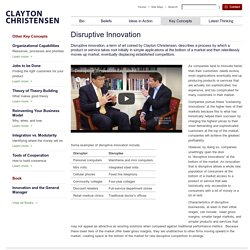
Companies pursue these “sustaining innovations” at the higher tiers of their markets because this is what has historically helped them succeed: by charging the highest prices to their most demanding and sophisticated customers at the top of the market, companies will achieve the greatest profitability. No Significant Difference - Presented by WCET. The Trouble with College, Online or Off. There is an editorial in the New York Times entitled "The Trouble with Online College" this morning about online education.
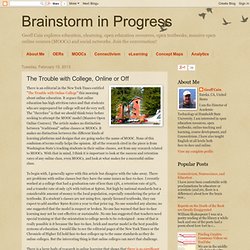
It argues that online education has high attrition rates and that students who are unprepared for college will not do very well. The "therefore" is that we should think twice before seeking to attempt the MOOC model (Massive Open Online Courses). The article makes no distinction between "traditional" online classes or MOOCs. Exploring MOOCs from the Corporate Perspective. AUDIO | Exploring MOOCs from the Corporate Perspective While individual companies might look at the MOOC model as an approach to delivering training to its employees, there is still a way to go before they are—in their current form—considered to be acceptable training options during company time.

The following interview was conducted with Dan Pontefract, TELUS’ senior director of learning and collaboration. Massive Open Online Courses (MOOCs) are gaining a lot of attention across the higher, continuing and professional education spaces for their capacity to deliver learning opportunities to large numbers of students for a relatively low cost. In this interview, Pontefract discusses how MOOCs could be operationalized in the corporate world, and whether he sees corporations coming together to develop industry-wide open-learning opportunities. To listen to The EvoLLLution’s interview with Dan Pontefract, please click here. 1. 2. 3. Business+MOOCs: the Hangout recording. Class Is in Session. The Shallows: What the Internet Is Doing to Our Brains: Nicholas Carr: 9780393339758: Amazon.com.